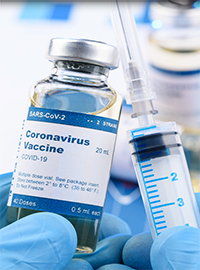| Vaccine Miracle: U.S. Pharma Naturally Leads the Way |
 |
|
By Timothy H. Lee
Thursday, November 12 2020 |
This week, American pharmaceutical innovators delivered a new miracle of human ingenuity: Less than twelve months since the coronavirus arrived, Pfizer Inc. announced a vaccine exceeding 90% effectiveness. It shouldn’t surprise anyone that the private U.S. pharmaceutical sector led the way in bringing that miracle to the world, just as it has for decades. As we’ve often highlighted – but which cannot be emphasized enough – the U.S. accounts for fully two-thirds of all new drugs introduced to the world, even though we’re just 4% of the world’s population and 25% of the world’s economy. We introduce as many new drugs as the rest of the world combined. That astonishing number didn’t occur by accident or coincidence. Rather, it results directly from America’s tradition of market-based incentives and strong intellectual property (IP) protections for those innovators. Whereas other advanced economies that practice socialized medicine and impose price controls inevitably experience drug shortages and less innovation, Americans consumers can access the full panoply of new drugs that our domestic innovators create each year. As the results of a new nationwide survey released by CFIF confirm, the American public overwhelmingly understands that cause/effect relationship, and wants to preserve it. In the poll conducted by Public Opinion Strategies for CFIF, voters across all parties, by a 70% to 30% supermajority, prefer that the federal government provide oversight and incentives to health care and pharmaceutical innovators, rather than have government bureaucrats set prices and micromanage health care policy. In other words, by more than two-to-one, American voters prefer a guiding hand to a heavy governmental fist. And that’s precisely the market-based system that incentivized Pfizer’s vaccine breakthrough, as noted enthusiastically by The Wall Street Journal: The apparent breakthrough is a credit to the innovative capacity of the private pharmaceutical industry. Pfizer has developed the vaccine using its own capital. That requires making a return on investment, which the politicians in both parties should keep in mind when they promise price controls on drugs. That would mean fewer resources to tackle the next coronavirus or deadly disease. In other words, America’s system of market incentives, rather than socialized medicine or price control regimes, fueled this remarkable achievement. Moreover, Pfizer's vaccine trial results thus far exceeds performance expectations and comparable disease vaccines. The U.S. Food and Drug Administration (FDA) generally requires a 50% effectiveness rate in order to consider expedited approval, while European officials have expressed willingness to approve vaccines even below 50% effectiveness. In fact, common influenza vaccines typically top out between 30% and 60% effectiveness. Pfizer’s vaccine, however, has apparently achieved an incredible 90% effectiveness. Just as importantly, no significant safety concerns have emerged during testing of Pfizer’s new vaccine, boosting the likelihood of rapid approval and distribution. Meanwhile, on the same day that Pfizer announced its breakthrough vaccine, federal regulators also approved emergency use of a new coronavirus treatment developed by Eli Lilly & Co., which has proven effective in preventing confirmed cases from becoming serious or life-threatening. Markets skyrocketed to new record territory on the news, as it offers promise that our economy might soon reaccelerate to the full speed that we reached before the pandemic unexpectedly hit. Taken as a whole, this week’s news provides just the latest testament to the value of America’s world-leading pharmaceutical sector. Outside of the U.S. military, few institutions can claim as many lives saved and improved over the years and decades as our domestic drug innovators. In turn, that reflects America’s deliberate choice to elevate free market incentives and strong intellectual property protections over heavy-fisted government regulation and suffocating drug price controls. Our system has provided this latest welcome pharmaceutical miracle, and it’s critical that our political leaders recognize this cause-and-effect relationship, lest we make future miracles less likely by opting for pharmaceutical and health care policies that have invariably failed everywhere else they’ve been attempted. |
Related Articles : |
























